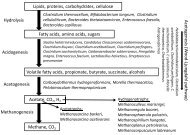Zymomonas mobilis - Biotechnology for Biofuels
Zymomonas mobilis - Biotechnology for Biofuels
Zymomonas mobilis - Biotechnology for Biofuels
Create successful ePaper yourself
Turn your PDF publications into a flip-book with our unique Google optimized e-Paper software.
He et al. <strong>Biotechnology</strong> <strong>for</strong> <strong>Biofuels</strong> 2012, 5:75 Page 4 of 10<br />
http://www.biotechnology<strong>for</strong>biofuels.com/content/5/1/75<br />
1: S1, Table S1 and S2). Table 1 provides a summary of the<br />
percentage of differentially expressed genes grouped by<br />
functional categories according to TIGR’s annotationof<br />
the Z. <strong>mobilis</strong> genome [22]. We have also deposited the<br />
entire microarray data at Gene Expression Omnibus<br />
(GEO, http://www.ncbi.nlm.nih.gov/geo/) database with<br />
the accession number of GSE39558 so interested parties<br />
can conduct their analyses (Please see Additional file 2).<br />
Approximately 34% of the genes down-regulated in the<br />
presence of ethanol were related to metabolism. In the<br />
presence of ethanol, about 62% of the genes related to<br />
regulation, cell processes, transport, and unknown function<br />
showed greater expression as compared to normal<br />
conditions. Nearly 24% of the genes including plasmid encoding<br />
genes showing greater expression under stress<br />
condition.<br />
To confirm the microarray results, nighteen genes involving<br />
in metabolism, in<strong>for</strong>mation transfer, plasmid encoding<br />
genes and hypothetical proteins were chosen <strong>for</strong><br />
the qPCR analysis (Table 2). The data showed that qPCR<br />
was more sensitive with greater differences in comparison<br />
to the microarray results (Additional file 1: Figure S2),<br />
Table 1 Number of differentially expressed genes under<br />
ethanol stress according to the Z. <strong>mobilis</strong> genome<br />
database<br />
COG category Upregulated<br />
genes<br />
Downregulated<br />
genes<br />
Energy production and conversion 1 5<br />
Cell cycle control 0 1<br />
Amino acid transport and metabolism 2 3<br />
Nucleotide transport and metabolism; 2 0<br />
Carbohydrate transport and metabolism 2 2<br />
Coenzyme transport and metabolism 4 1<br />
Translation 2 1<br />
Transcription 1 2<br />
Replication, recombination and repair 4 0<br />
Cell wall/membrane biogenesis 4 0<br />
Cell motility 0 2<br />
Posttranslational modification,<br />
protein turnover, chaperones<br />
1 1<br />
Inorganic ion transport and metabolism 2 3<br />
General function prediction only 7 4<br />
Function unknown 4 3<br />
Signal transduction mechanisms 4 0<br />
Intracellular trafficking and secretion 2 0<br />
Defense mechanisms 1 0<br />
not in COGs 16 5<br />
plasmid encoding genes. 30 5<br />
Total 89 38<br />
which was in keeping with previous reports [31,32]. On<br />
the other hand, genes involving in Entner-Doudoroff (ED)<br />
and pyruvate pathways were also chosen <strong>for</strong> the qPCR<br />
analysis, which showed the same results as microarray<br />
(data not shown).<br />
Transcripts of Entner-Doudoroff (ED) pathway<br />
As expected, 23 Entner-Doudoroff (ED) pathway<br />
mRNAs such as glk, zwf, pgl, pgk and eno, as well as<br />
ethanol fermentation-related genes like pdc and adhB<br />
were shown to be less abundant under stress conditions,<br />
but at levels not considered significant. Only two genes<br />
of ED and pyruvate biosunethetic pathway were showed<br />
significantly down-regulated during ethanol stress (1.5fold<br />
change <strong>for</strong> gnl, and 1.1-fold change <strong>for</strong> gntK,<br />
Table 3), which may help us to elucidate its negative<br />
effects on cell growth or glucose consumption during<br />
ethanol stress. Actually, previous studies have hypothesized<br />
that this inhibition is due to direct action of ethanol<br />
on key enzymes of glycolysis and ethanol production<br />
involving feedback inhibition or enzyme inactivation.<br />
However, in vitro studies of these enzymes in Z. <strong>mobilis</strong><br />
and S. cerevisiae do not fully support this hypothesis.<br />
Further research indicated that inhibition of fermentation<br />
by ethanol appears to result from increased leakage<br />
through the plasma membrane, allowing loss of cofactors<br />
and coenzymes, and also coupled with possible additional<br />
leakage of intermediary metabolites en route to<br />
ethanol <strong>for</strong>mation [2]. On the other hand, ldhA also<br />
showed nearly significantly down-regulated during ethanol<br />
stress condition, which may be lead to decrease lactic<br />
acid <strong>for</strong>mation (about 50%) and improve the<br />
efficiency of glucose utilization under ethanol stress.<br />
Induction and repression of cell envelope components<br />
under ethanol stress<br />
There are 32 ORFs (ZMO0602-ZMO0652: flgABCDEF-<br />
GHIJKL, flhAB, fliDEFGHIKLMNPQRS, motAB) encoding<br />
flagellar structure proteins, motor proteins and<br />
biosynthesis proteins in Z. <strong>mobilis</strong>. As expected, two<br />
genes involving in cell motility showed down-regulated<br />
under ethanol stress, such as ZMO0613 (flgC, 1.0-fold)<br />
and ZMO0614 (flgB, 1.3-fold). Most flagellar-related<br />
genes, such as ZMO0604 (flgL), ZMO0605, ZMO0607,<br />
ZMO0608 (flgH), ZMO0609, ZMO0610, ZMO0611,<br />
ZMO0612, ZMO0619, ZMO0624 (flhA), ZMO0632 (fliE),<br />
ZMO0634, ZMO0635 (fliG), ZMO0642, ZMO0643,<br />
ZMO0648, ZMO0649, ZMO0651 and ZMO0652 showed<br />
also down-regulated under ethanol stress condition.<br />
However, the transcripts encoding MltA domaincontaining<br />
protein (ZMO2023), cell wall hydrolase SleB<br />
(ZMO0448), peptidase M23 (ZMO0216) and organic<br />
solvent tolerance protein ostA (ZMO1311) were shown to<br />
be more abundant under stress condition by microarray



